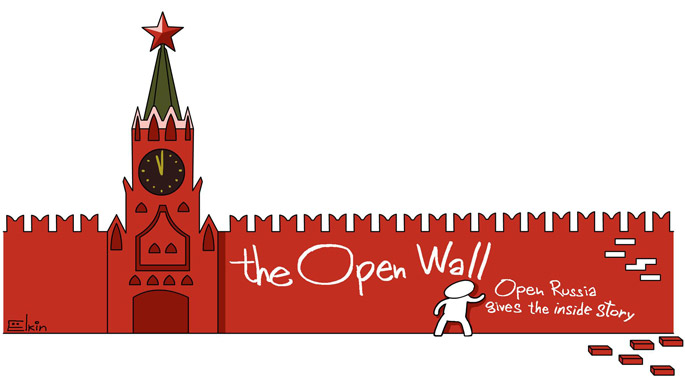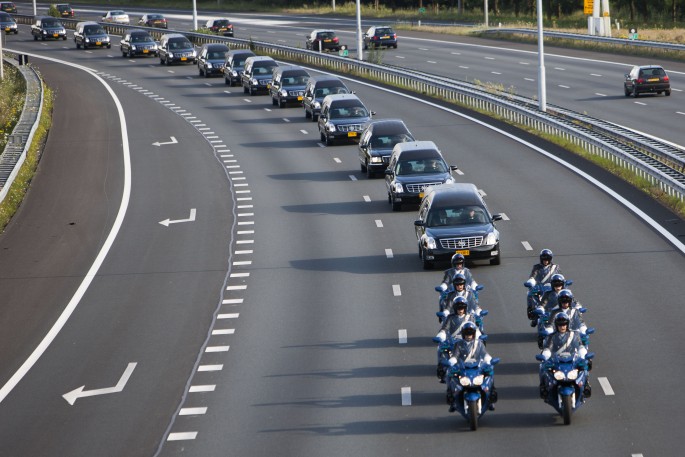MH17 in Russia

MH17 in Russia
Recent confirmation that the Buk missile system used to down flight MH17 over Ukraine in July 2014 was indeed of Russian origin has failed to make a serious stir in Russia itself.

Some Russians have known this fact all along, others refuse to know anything as a matter of principle, and still others are in thrall to the Klemlin’s propaganda.
Unsurprisingly enough, the Joint Investigation Team’s latest findings caught the attention of those who have long suspected Moscow to be behind the disaster. Thus, journalist Sergei Parkhomenko, for whom the report only served to confirm what he’d always believed anyway, ventured to predict that the people responsible for the downing of the plane – from those who “masterminded the whole operation” to those who “pressed the button” – will “inevitably” face trial.
For many other Russians, however, MH17 has long become just another brouhaha. Here’s how passersby on the streets of Moscow assessed their own degree of familiarity with the investigation:
“These are far-off events, and you don’t keep track of the way they’re developing” (young woman);
“I try not to know about all this” (middle-aged man);
“I prefer not to delve into these issues for psychological reasons” (young woman).
For two years and two months now, Russia’s government experts and army generals have been herded into press conferences whenever a statement from the international investigation team is imminent, the objective being to supply propagandist journos with counter-conclusions and counter-quotes. This time round, the generals claimed that the Western investigators had been provided with so-called primary radar data demonstrating that no missile was fired at the plane from the east (that is, from territory under separatist control at the time).
Presidential press secretary Dmitry Peskov, too, emphasised the exceptional importance of the radar data an hour before the investigation team’s report was published: “We have irrefutable facts. [You cannot] draw conclusions without taking into account the latest published information, namely the primary radar data. The data are unambiguous, and there’s no missile (that allegedly brought down the plane) in that data. This isn’t something you can argue with – it’s beyond any discussion.”
Moscow contends, then, that data from the Utyos-T radar station (sited in Rostov Region, not far from the Russian-Ukrainian border) offer irrefutable proof that the Russian Buk system had nothing to do with the downing of MH17. But why, in that case, has information of such exceptional significance been made public only now, two years and two months after the disaster, and only two days prior to the international investigation team’s press conference?
According to an official spokesman for the Lianozovo Electromechanical Plant, where the Utyos-T station was designed and constructed, radar data from the latter were obtained by the plant’s specialists back in July 2014 as part of routine maintenance works; it was subsequently stored at the plant, he said, “in order to facilitate further quality control of the system – to help identify and analyse possible problems and prevent potential errors.”
Military analyst Alexander Golts, for his part, reacted to these claims with scorn and derision: “Russian officials are making a serious attempt to convince everyone that, in the wake of such an enormous tragedy, no one thought to check the data of a crucial radar station responsible for controlling air traffic in the region. And, furthermore, that the people who serviced the station made no attempt to inform the authorities about the data in their possession.”
But the Kremlin’s propagandists chose to remain silent on the subject of these oddities. On the day the findings of the investigation were announced in the Netherlands, they were putting a rather different spin on things.
Russia-1: “For two-and-a-bit years, Western investigators have been customising the findings to fit the theory that the missile was fired from the village of Snezhnoye. This theory is an expedient one for both the West and Ukraine – pro-Russian forces were there at the time. The investigators didn’t analyse all the available fragments of the aircraft in order to formulate their conclusions – they analysed only those that were compatible with the theory they wanted to advance.”
Channel One: “The computer simulation data that underpins the international investigation team’s report fails to correspond in several key aspects with the actual scenario of the disaster.”
And so on and so forth.
But, for all the glibness of this propaganda rhetoric, Pavel Kanygin, a correspondent for the liberal Novaya Gazeta newspaper, has noted a certain degree of discomfiture among the ranks of Russia’s pro-Kremlin journalists: “[A correspondent for a state channel] called Moscow and asked […] for an explanation of what ideological spin should be put on all this.” The comportment of his “colleagues,” Kanygin adds, has occasionally been outright shameful to watch: “Even as the investigation’s findings are being released, Russian TV journalists are all going on about some sort of alternative data from Almaz-Antey, about […] Russia having a different approach but not being heard out, etc. If only a single one of them would just stop coming out with this bullshit […].”
While the Kremlin propagandists and their supervisors are unlikely to be mulling over the extent of their personal responsibility for the tragedy, the question is of paramount importance for Ilya Barabanov, one of Russia’s finest military journalists: “The blame lies not only with those who took the decision and gave the order,” he insists. “Not only with those who shrieked and screamed about the ‘crimes of the junta’ and the idea of ‘Novorossiya.’ The blame lies with everyone, and, after yesterday’s events, it’s very important that we try to comprehend this. 298 deaths on the conscience of a Russian Buk missile. […] and think a bit about what we’ve allowed ourselves to become, about how it is that 73-year-old Jane Adi Soetjipto never made it home to Jakarta, or how 12-year-old Friso Hoare never made it to the resort promised to him by his parents.”



